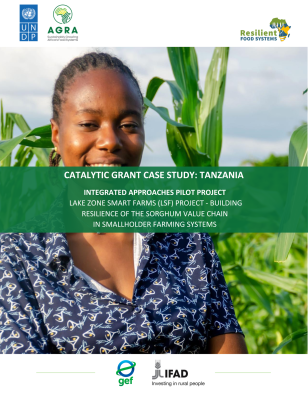Case Studies for the RFS Catalytic Grant Projects: Tanzania

Case Studies for the RFS Catalytic Grant Projects: Tanzania
March 21, 2024
Under the Resilient Food System (RFS) Programme, UNDP and AGRA co-designed three catalytic grant projects to pilot innovative approaches and model projects to showcase and develop practical methodologies of promoting Green Value Chain Development in East, Southern and West Africa.
In Tanzania, the catalytic grant project “Lake Zone Smart Farms (LSF) Project – Building resilience of the sorghum value chain in smallholder farming systems" was implemented in three districts: Shinyanga, Kishavu in the Shinyanga region, and Meatu in the Simiyu region. The project sought to demonstrate how integration, promotion of alternative crops within dominant farming systems for diversification, and improved natural resources management such as soil health and nutrient management cycles can create sustainability in the transformation of food systems. The project also utilised active and targeted learning through on-field demonstrations and facilitated/strengthened linkages between value chain stakeholders. It further addressed key bottlenecks in agriculture input and output systems.
This case study documents the process of the implementation of the catalytic grant project. It puts together key lessons, success and/or failure factors, and outlines the project results as part of the process of documenting and disseminating information that can be used by multiple stakeholders including policy and decision-makers, project developers, funding agencies, and the private sector for widescale application of greening principles in food systems particularly in response to the challenges and impacts of climate change and environmental degradation.

 Locations
Locations